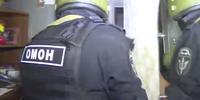The Case of Shiyan and Matveeva in Lesosibirsk
Filter
- #
A woman who portrays an interest in Bible teachings secretly records worship services of Jehovah's Witnesses and her conversations about the Bible with believers.
- #
Andrey Shiyan is undergoing the first search in the criminal case of Valeriy Shitz.
- #
- #
The materials against Anna Matveeva are separated into separate proceedings from the case of Valery Sheets.
- #
Shiyan's case is separated from the Shitz case into a separate proceeding.
- #
The Lesosibirsk City Court of the Krasnoyarsk Territory issues a search warrant for Shiyan.
- #
Investigator Kunko interrogates Anna Matveeva as a suspect and takes a written undertaking not to leave her place.
- #
The investigation involves Anna Matveyeva as a defendant in committing a crime under Part 2 of Article 282.2 of the Criminal Code of the Russian Federation.
- #
A second search of the believer is carried out. Data carriers, electronic devices and biblical literature are seized.
The senior investigator of the investigation department for the city of Lesosibirsk, Major of Justice Artem Kunko, chooses a preventive measure for Andrey Shiyan in the form of a written undertaking not to leave and proper behavior. - #
Matveeva's case is submitted to the Lesosibirsk City Court of the Krasnoyarsk Territory. It will be considered by judge Larisa Burdukovskaya.
- #
Senior investigator of the investigation department for the city of Lesosibirsk, senior lieutenant of justice M. A. Pozdnyakova attracts Andrey Shiyan as an accused and again chooses for him a measure of restraint in the form of a written undertaking not to leave and proper behavior.
- #
Within the framework of Article 217 of the Code of Criminal Procedure of the Russian Federation, Andrey Shiyan begins to get acquainted with the case materials.
- #
The accused petitions for the termination of the criminal case. He states that he does not plead guilty to the crime, that the charge against him is unclear and that the exercise of constitutional and internationally protected rights cannot be considered a crime. Shiyan considers his involvement as an accused as discrimination and repression on the basis of religious affiliation and believes that the criminal case initiated against him should be terminated due to the absence of corpus delicti in his actions.
Investigator Pozdnyakov refuses to satisfy his request.
- #
The prosecutor of the city of Lesosibirsk, Dmitry Snyatkov, approves the indictment against Andrey Shiyan. The accusation is based, among other things, on the testimony of secret witnesses, as well as Grigory Illarionov, associate professor of the Department of Philosophy at Siberian Federal University, who acts as an expert.
- #
Shiyan's case is submitted to the Lesosibirsk City Court of the Krasnoyarsk Territory. It will be considered by judge Larisa Burdukovskaya.
- #
At the request of the prosecutor, the judge merges the criminal cases of Andrey Shiyan and Anna Matveeva into one.
- #
The lawyer files a complaint against the merger of the cases of Shiyan and Matveeva.
- #
The defense is petitioning for the recusal of Judge Larisa Burdukovskaya. The court refuses.
The lawyer also submits a motion to provide the defendants with time to familiarize themselves with the case materials after the connection of criminal cases - a total of 22 volumes. For this, the judge allocates 2 days to the defendants.
- #
The case materials are transferred to another judge, Yevhen Zadvorny. The case begins from the beginning.
- #
Andrey Shiyan and Anna Matveeva express their attitude to the charges brought against them: they do not consider themselves guilty.
Andrey Shiyan claims that the investigator substituted concepts and called the usual confession of faith extremist activity. He goes on to say: "I am wrongly accused of not renouncing my religion, but continuing to practice it with other believers. […] It is not clear to me on the basis of what authority the state prosecutor extrajudicially banned the religion of Jehovah's Witnesses."
Anna says: "The indictment shows again and again that my fault was that I prayed with others, sang religious songs with them, listened to sermons. […] Nowhere in the decision of the Supreme Court of the Russian Federation does it say that it considered these ways of worship of God as unacceptable and even more so extremist."
- #
Interrogation of a classified prosecution witness. The lawyer reads out a motion to disclose the identity of the witness, since there were no threats or illegal actions on the part of the accused, and they are characterized as exemplary and peace-loving people. The judge asks for the opinion of the prosecutor, who is categorically against the disclosure of the identity of the witness and visual interrogation. The witness is interrogated by the judge in another room. The defence is not allowed to speak to him, and the lawyer passes his questions through the judge, who has to go from the courtroom to another room and back again to get answers.
- #
Candidate of Philosophical Sciences Grigory Illarionov, who carried out an examination in the case of Shiyan, Matveeva and other believers from Lesosibirsk, is being interrogated. Illarionov talks about his vision of the history and structure of the organization of Jehovah's Witnesses. He says that only legal entities are banned in Russia, but not faith itself.
The next to be questioned is specialist Alla Kepchatova, who conducted a psychological and linguistic study. From the materials presented, she concludes that the participants in the conversations consider themselves to be Jehovah's Witnesses. She calls the discussion of the Bible as part of online meetings for worship, where only the believers themselves were present, as propaganda.
- #
A prosecution witness under the pseudonym Fedorov is interrogated. The defense petitions for the disclosure of the identity of the witness, pointing to the absence of a real threat and the need for visual observation for a full-fledged interrogation. The court rejects the petition.
Fedorov says that he knows Jehovah's Witnesses from Krasnoyarsk and knows about believers from Lesosibirsk by hearsay. He does not know Andrey Shiyan and Anna Matveeva. According to the witness, he did not receive any threats from the believers.
- #
The head teacher of the school where Anna Matveeva has been working for about 20 years is being interrogated. She characterizes the believer as a professional teacher with an individual approach. The witness says: "Anna Nikolaevna has a diploma from the city methodological community, she was also awarded a diploma of the legislative assembly of the region, has a letter of gratitude from the Ministry of the Russian Federation. In 2021, Anna Nikolaevna took 2nd place in Russia in the all-Russian competition... she was presented with this award in the small hall of the State Duma... For many years, she led a methodological community in the city for working with children with individual developmental disorders. She is a mentor to young teachers... This year, a specialist, a girl brought up, so to speak, by Anna Nikolaevna, showed herself at the city competition "Teacher of the Year". And in the nomination "Discovery of the Year" she was the leader.
She continues: "Relations with all colleagues are pleasant. Anna Nikolaevna is always positive, when you need support, prompt, no one is afraid to ask her for help."
- #
Anna Matveeva testifies. According to the believer, she did not take part in the activities of the Local Religious Organization of Jehovah's Witnesses in Lesosibirsk, did not familiarize herself with its charter and did not sign any documents of this organization. Anna declares: "To commit... I never intended to violate the rights and freedoms of a person and a citizen depending on his religious affiliation and attitude to religion, as this contradicts my position in life. I respect state bodies, as well as the rights of third parties to independently determine their religious affiliation." Matveeva emphasizes that saying prayers, singing spiritual songs and studying religious sources are common ways of expressing faith, guaranteed by the Constitution of the Russian Federation.
In his testimony in court, Andrey Shiyan states: "I consider bringing me as a defendant as discrimination and repression on the basis of religious affiliation." He pleaded not guilty, explaining that he was exercising his constitutional right to freedom of religion.
The court rejects the defense's motion to exclude 12 CDs, as well as expert opinions, from the case file. The judge attaches to the case file information about the illnesses of Andrey Shiyan and his elderly mother, as well as data on the employment of the defendants and the fact that Matveeva has a dependent daughter.
- #
The prosecutor requests real terms for Andrey Shiyan and Anna Matveeva: for Andrey - 6 years and 6 months, and for Anna - 2 years and 6 months.
The believers, their lawyers and the prosecutor speak in the debate, and then the defendants make their final statement.
Defendant Andrey Shiyan's last word in Lesosibirsk Defendant Anna Matveeva's concluding remarks in Lesosibirsk - #
- #
The Lesosibirsk City Court changes the preventive measure against Andrey Shiyan to a recognizance agreement due to his severe diabetes — a disease preventing detention. His life depends on regular medication and he needs constant medical observation. Thanks to the court's decision, he will be able to stay at home until his case is considered in the court of appeal.
- #
To be published later.
- #
The court appoints a forensic medical examination in order to determine the severity of Andrey Shiyan's illnesses. The hearing was postponed until the results of the examination are received.


